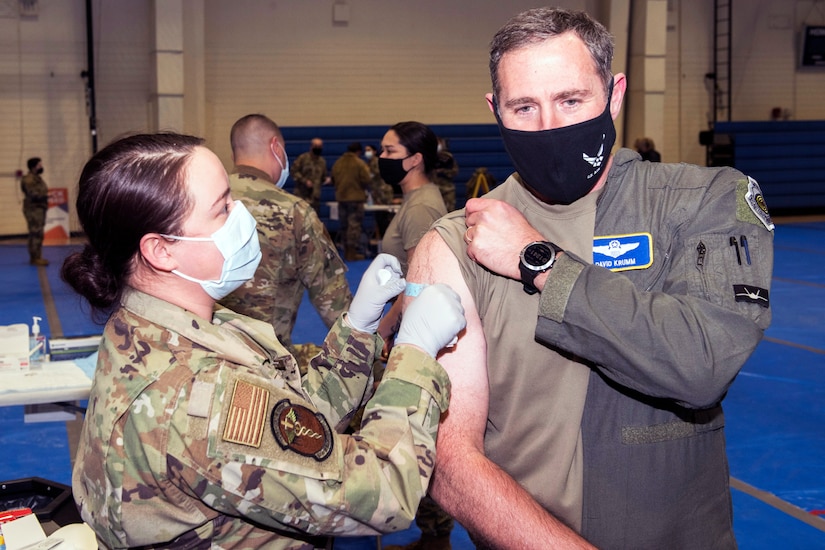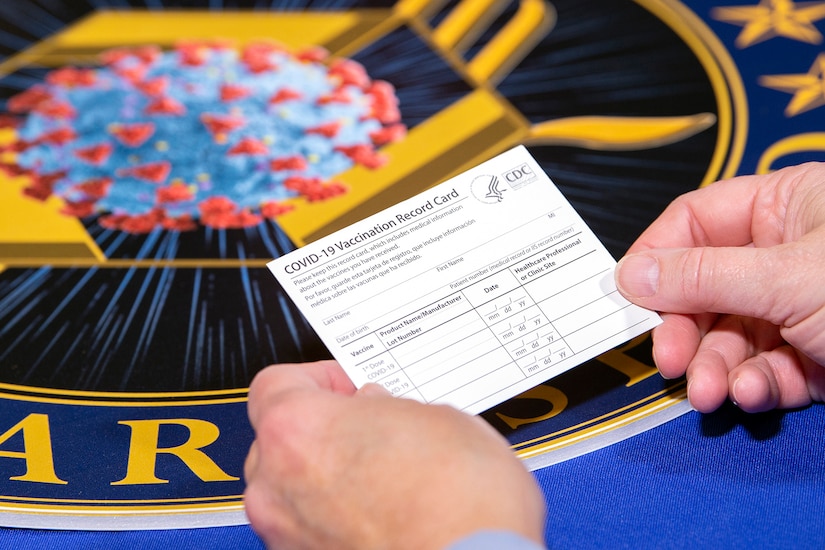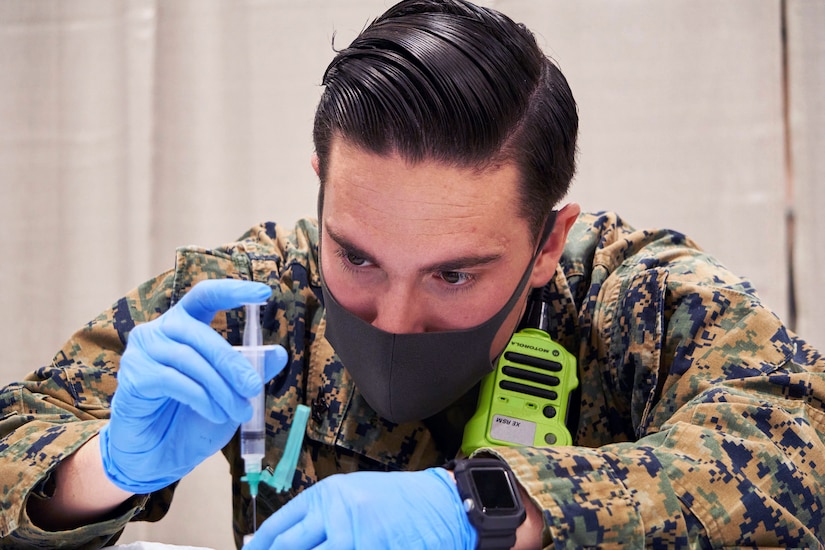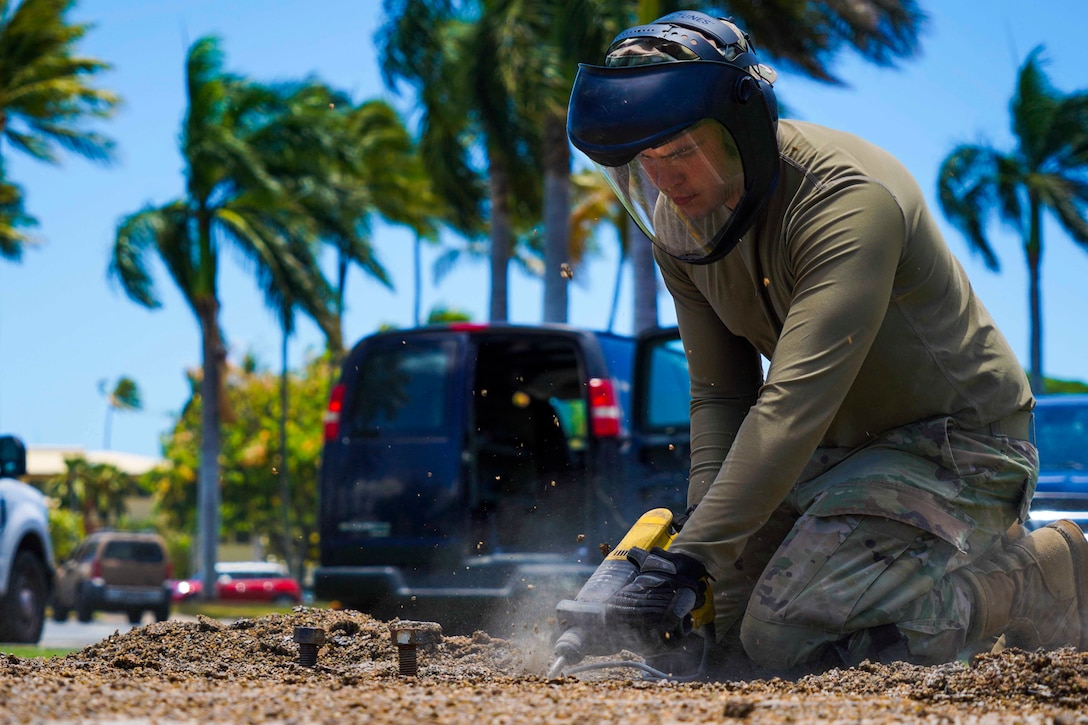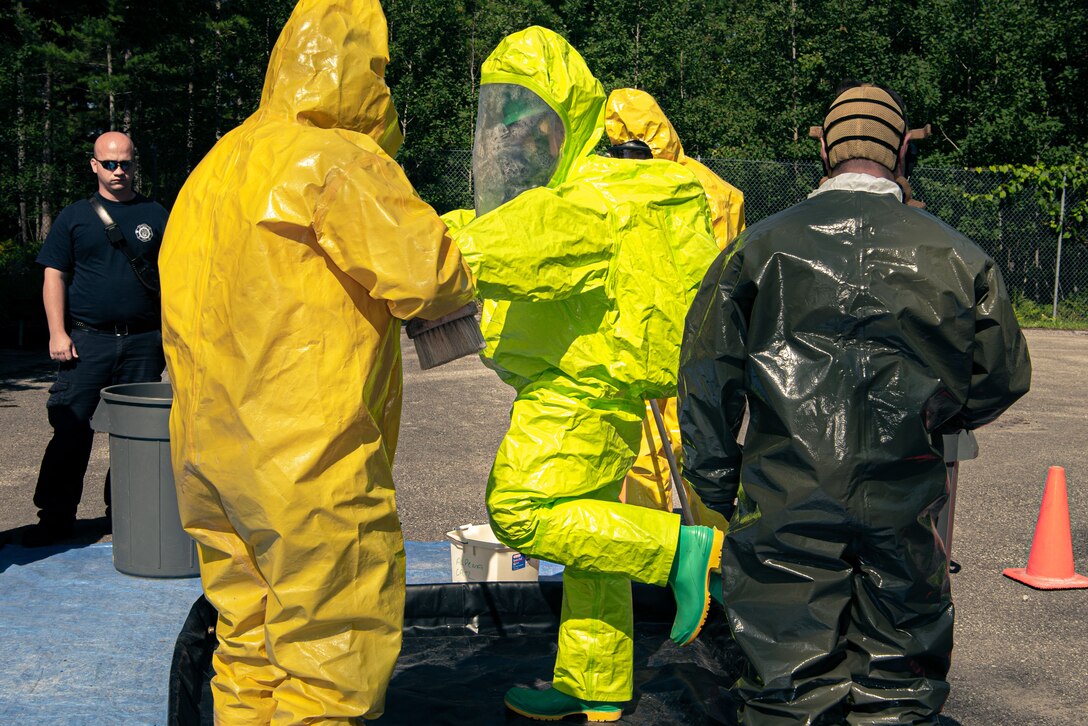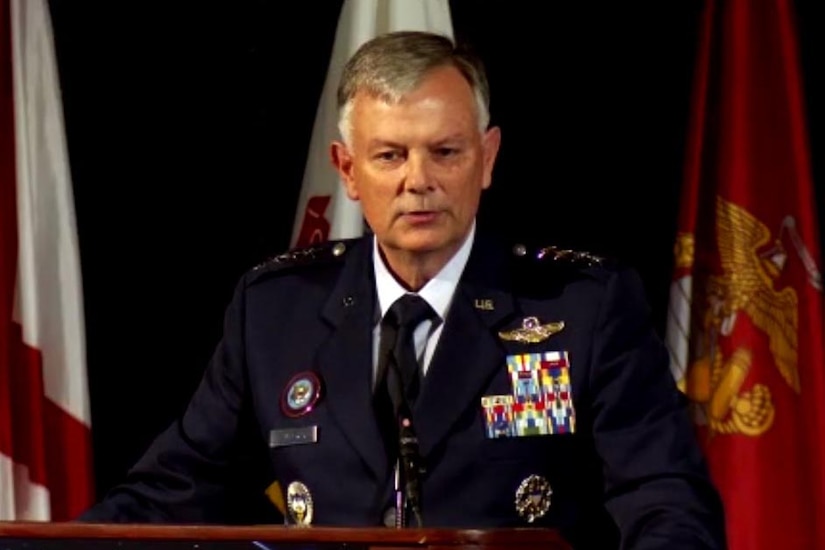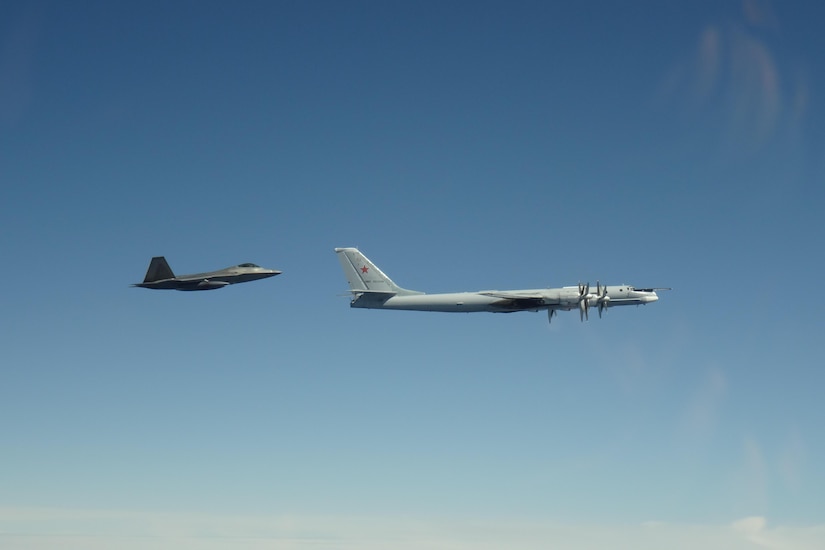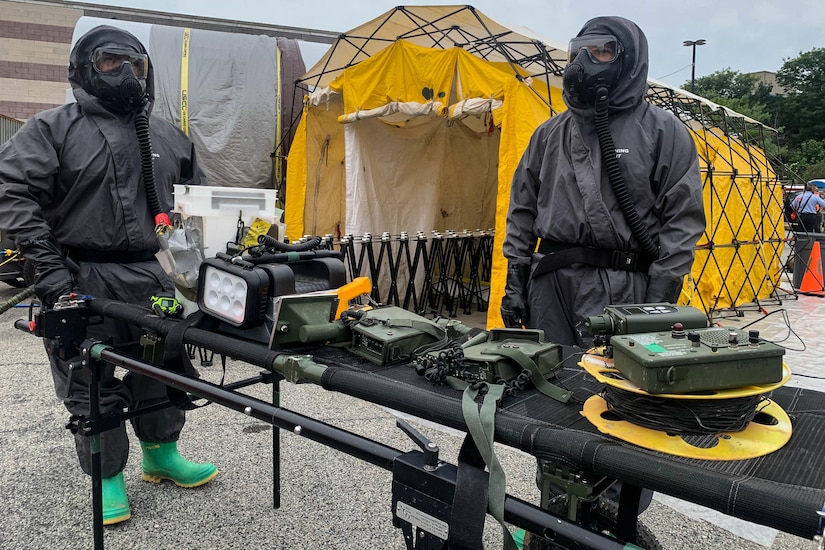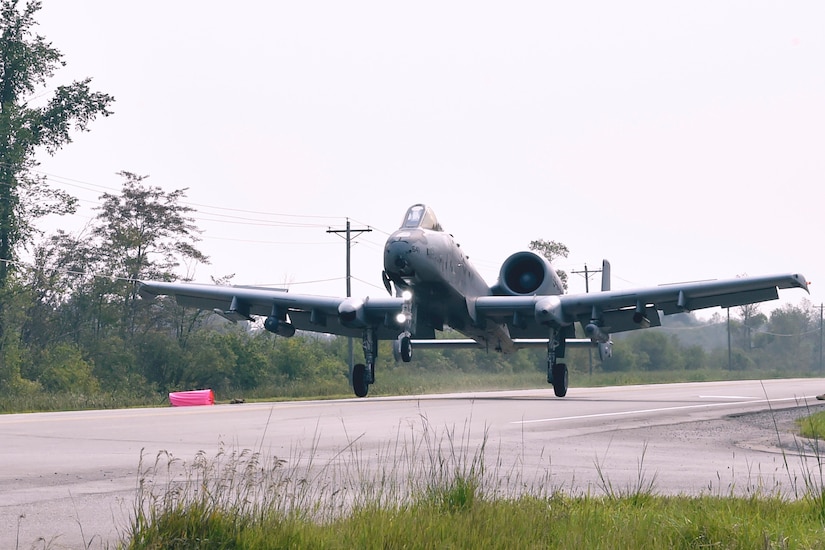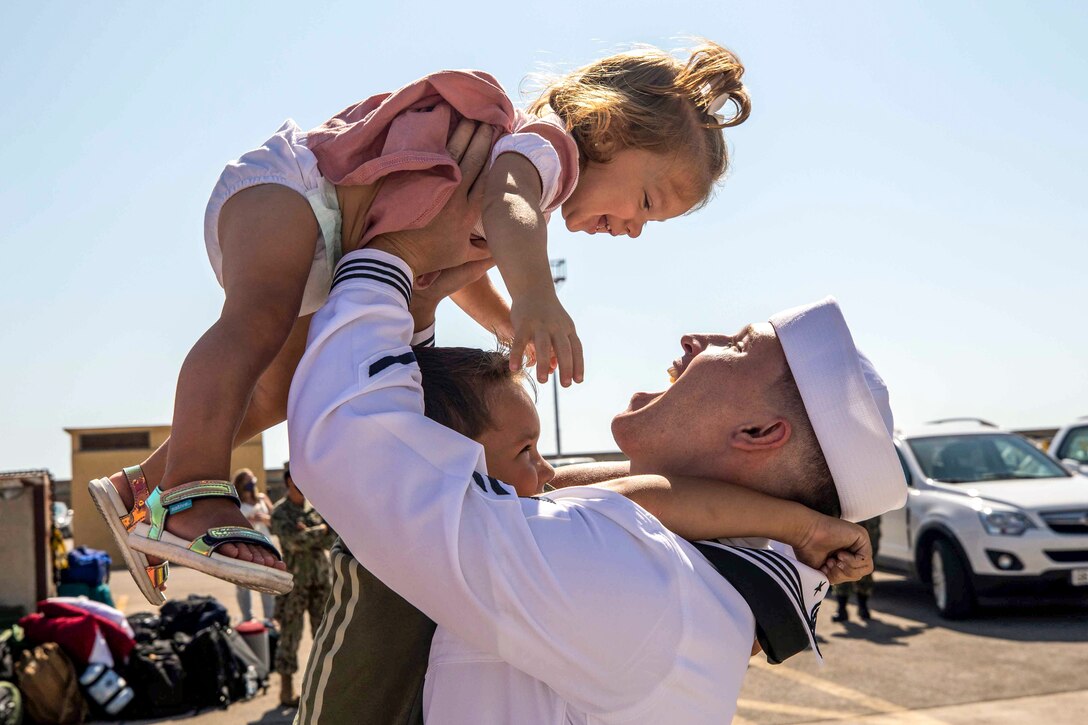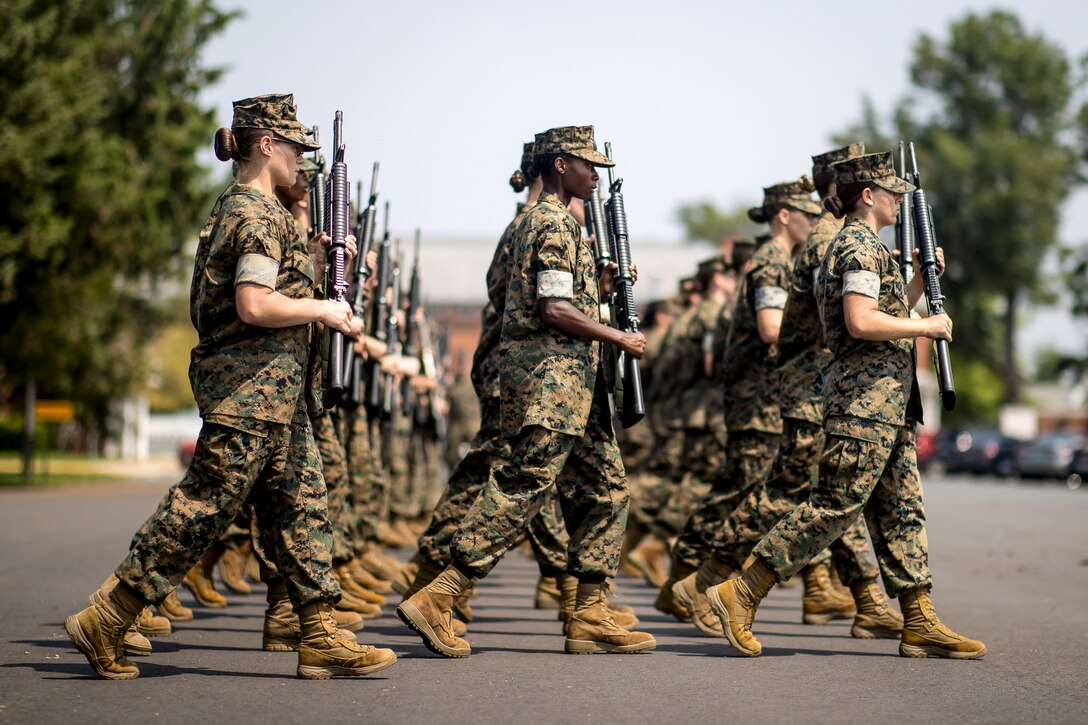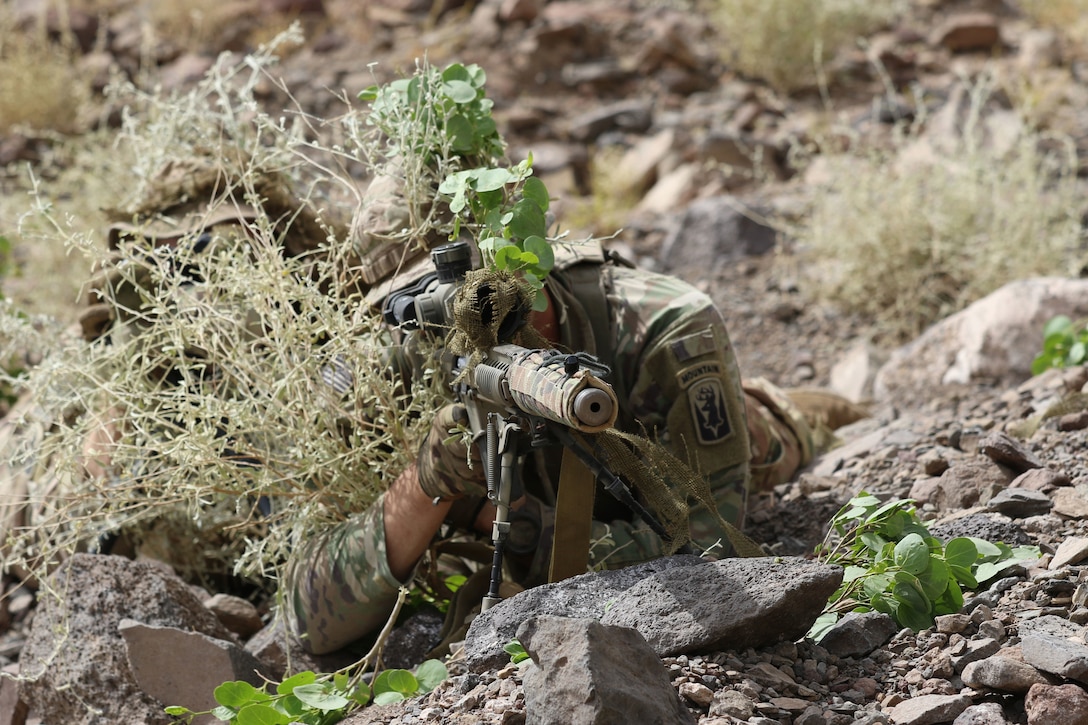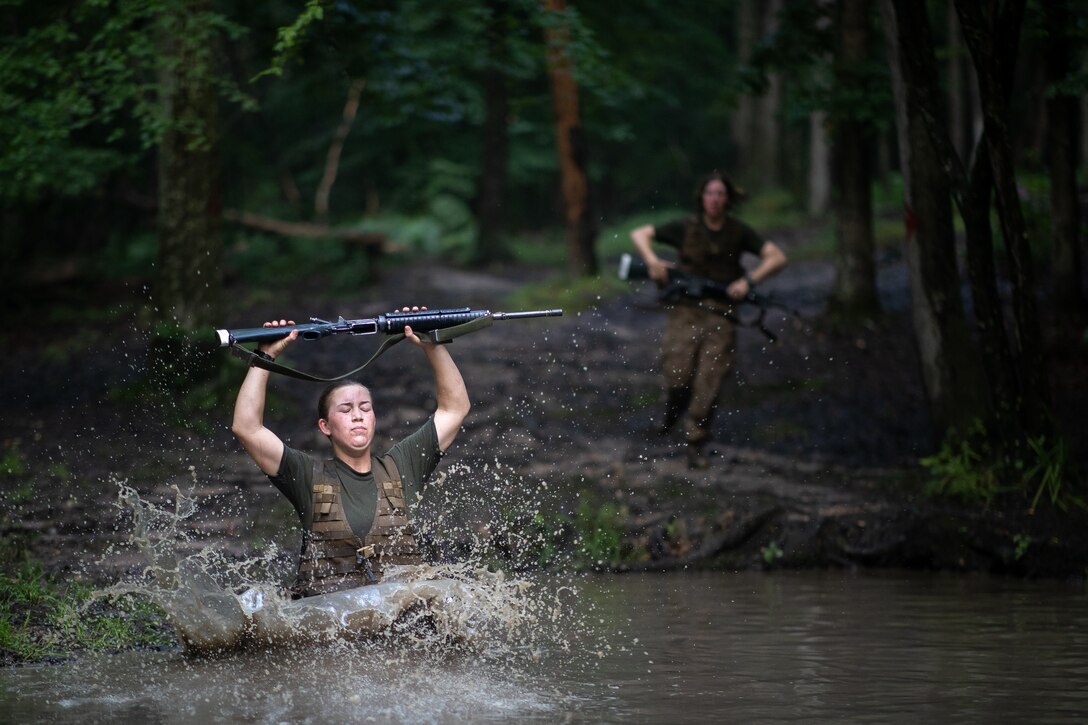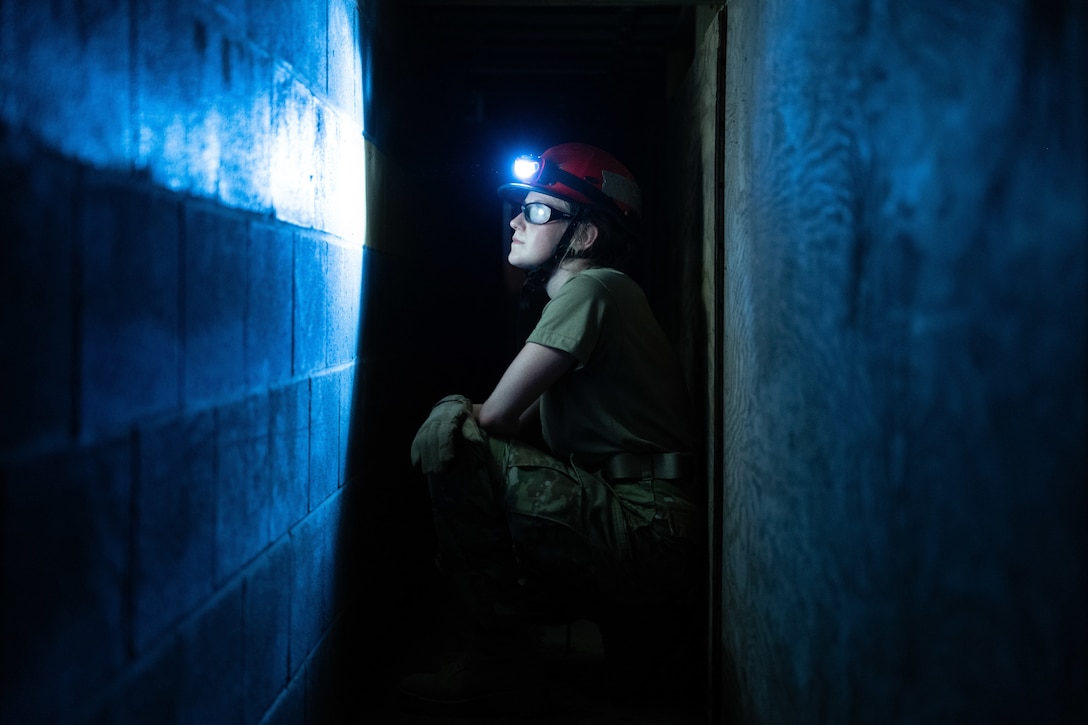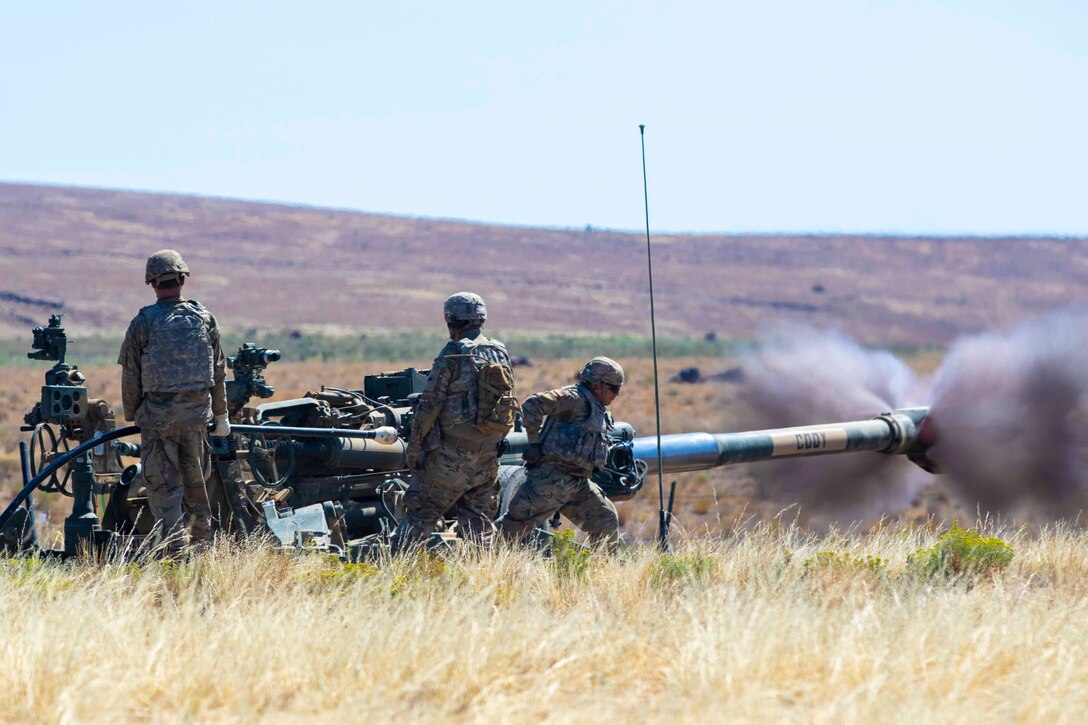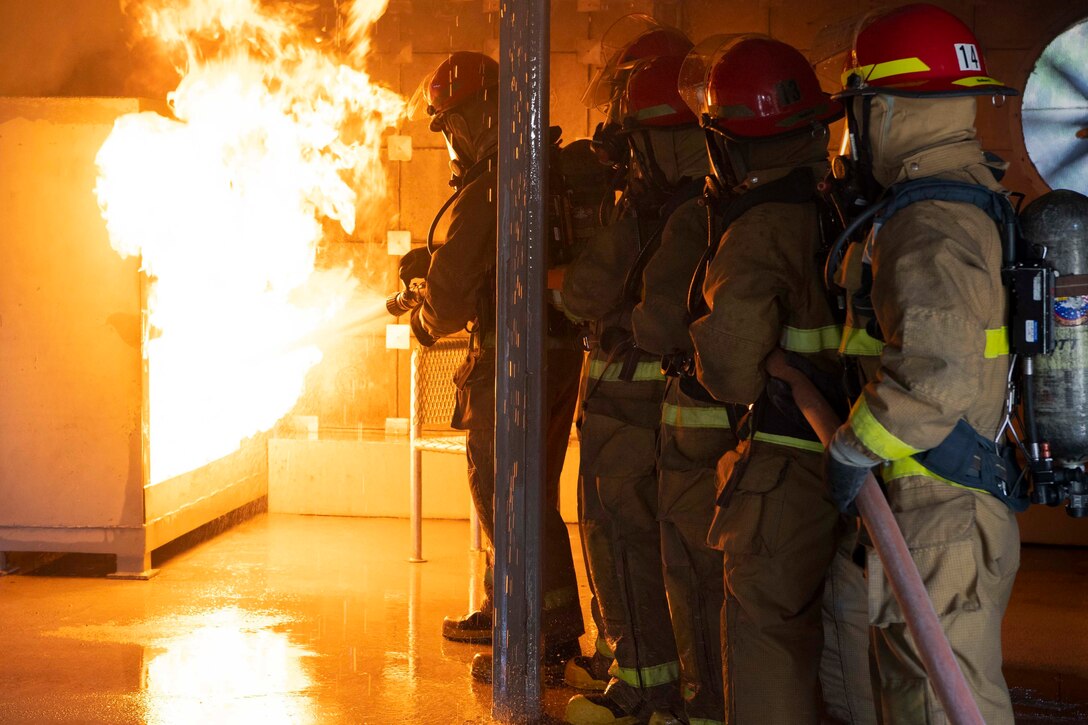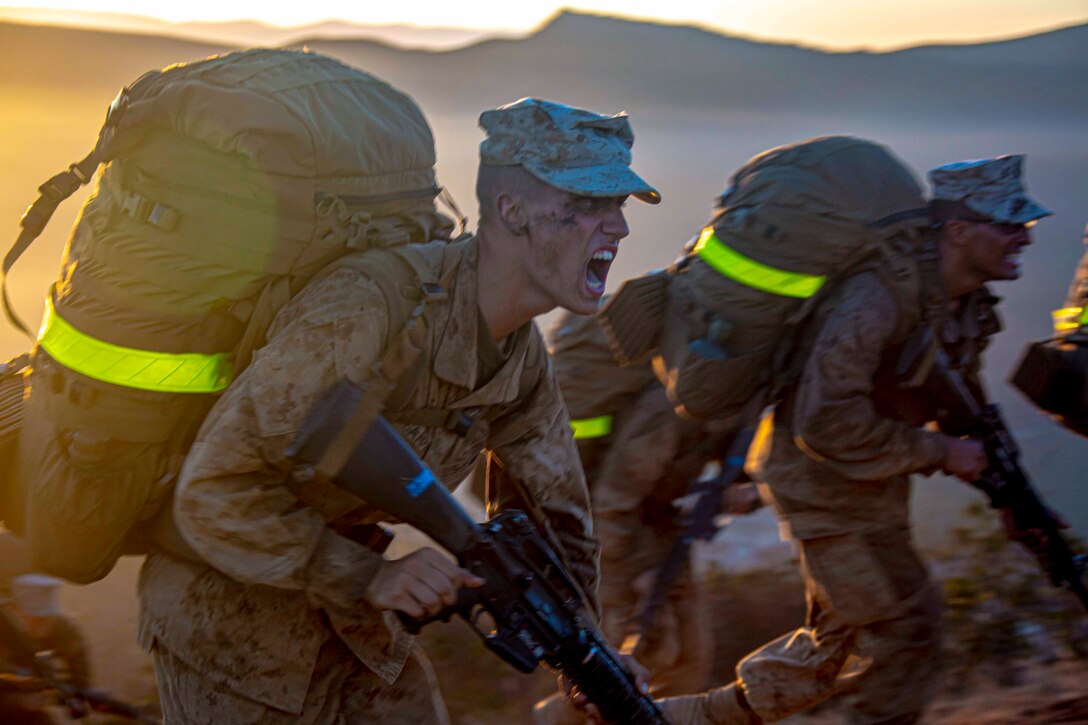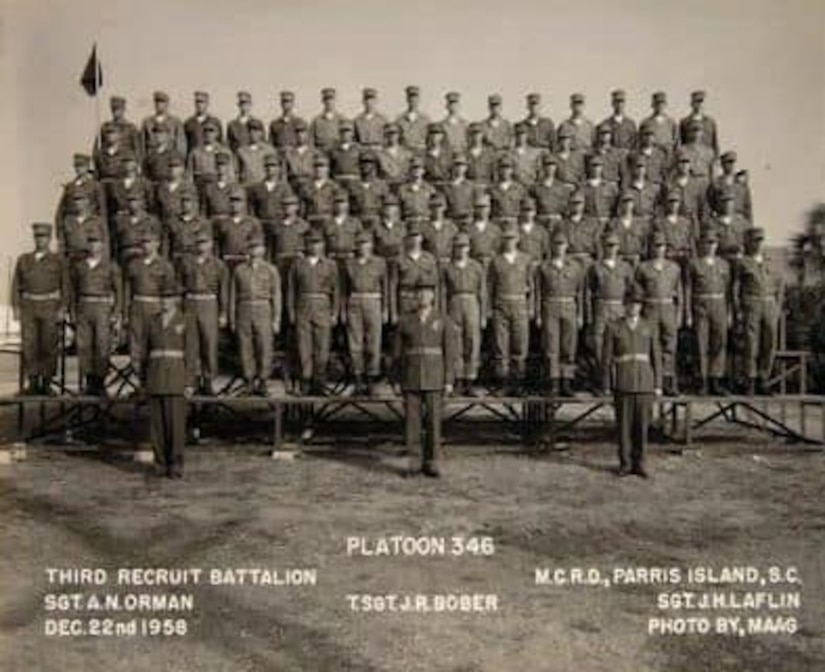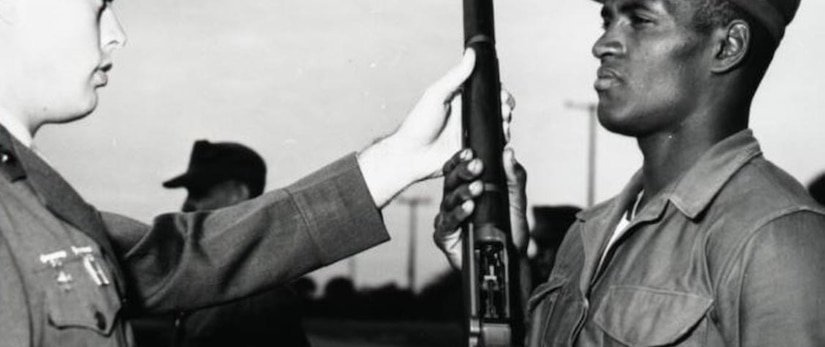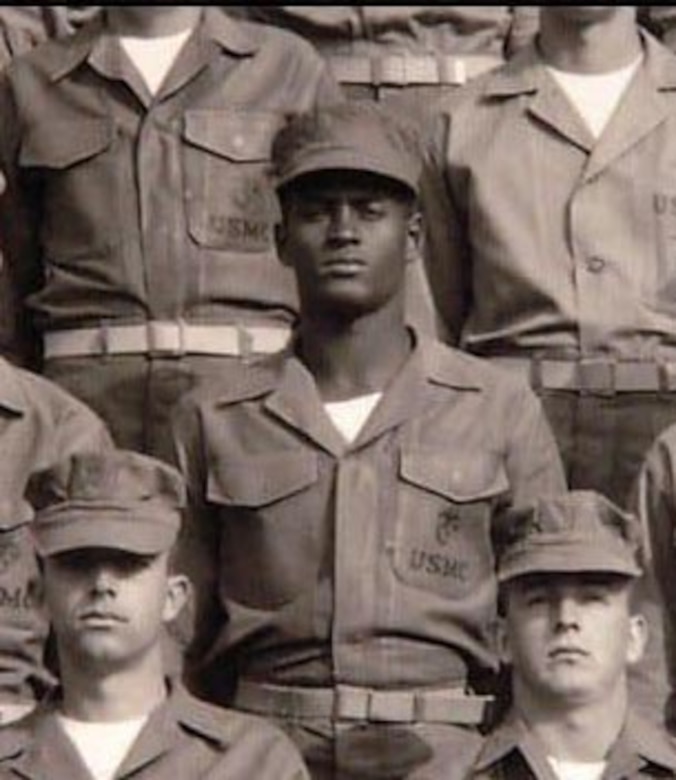Aug. 9, 2021
Pentagon Press Secretary John F. Kirby
PRESS SECRETARY JOHN F. KIRBY: So a few things off
the top. Bear with me. OK, I think you've seen by now the Secretary's
memo to the -- message to the force about COVID vaccines. That -- that's
public now, so I'm not going to re-read it for you. I think you all can
get the gist of it.
I would just point out that there's sort of three elements here to
it. One is that -- that he will -- it -- request approval from the
President for a waiver to make the COVID vaccines mandatory by
mid-September -- he'll make the request for the waiver by mid-September.
I've seen some reporting out there that that means that all of the
troops have to be vaccinated by mid-September. That's not accurate.
He'll make the request by mid-September, unless or until FDA licensure
occurs before that time, at which point the Secretary has the authority
he needs, upon FDA licensure, to issue -- to make whatever vaccine is
then given that license mandatory. I just want to clear that up. That's
point number one.
Point number two, in the meantime, two things are going to happen.
One, the services are going to be tasked to come back to the Secretary
with implementation plans for how they're going to get this moving. And
there is not probably a lot of time between now -- certainly not a lot
of time between now and mid-September, but if FDA licensure comes sooner
than that, and there's press reporting to suggest that the Pfizer
vaccine will be perhaps even completely approved by the end of this
month -- so the services have a -- a -- a fair but limited amount of
time to come back to the Secretary with their implementation plans for
how they would go about mandatory vaccines for all their personnel. We
have -- understand, of course, that they have their own deployment
schedules, their own manning constructs, their own differences in -- in
unvaccinated numbers, and so we're going to be respectful of that.
The second thing that will happen in the meantime is that we are
going to be developing policies to comply with the President's direction
that the unvaccinated will have to be subjected to certain requirements
and restrictions. I don't have the details for all of that today. We're
working hard on what will be a policy directive to come in the coming
days, that will make it clear what those requirements and restrictions
are and how they apply to everybody in the DOD workforce, including
uniformed personnel.
And then the last thing that I'd say about this memo is -- and I hope
you caught the -- the -- the -- towards the end of it, where the
Secretary says we're going to watch the trends closely. We're seeing an
uptick in cases, uptick in hospitalizations across the force, as we are
in the country, and the Delta variant is a factor in that. So we're
going to watch it closely.
And the -- as the Secretary told the force today, if he needs to move
-- act sooner than this timeline, then he'll do that. So we're going to
watch the trends and -- and make sure that we're keeping readiness of
the force at the forefront. So that's the memo.
A couple of other things that I want to hit, if I can get this to
work. As you may have seen, the Senate confirmed Carlos Del Toro, a
former surface warfare officer, as the 78th Secretary of the Navy. As
the Secretary noted in his statement, Mr. Del Toro was a student of the
U.S. Naval Academy, Naval Post-Graduate School, Naval War College. He
rose through the ranks to serve as the First Commanding Officer of -- of
the destroyer Bulkeley DDG-84, and then he later worked at senior
levels here at the Pentagon. The Secretary is delighted to have him on
board.
He should be sworn in here very, very shortly and that will round out
our service secretaries. Each of the military departments now have a
Senate-confirmed, fully installed service secretary, and the Secretary's
grateful for Mr. Del Toro's willingness to serve his country again here
in the Department of the Navy.
I also want to recognize Chris Mayer for his Senate confirmation over
the weekend to be our next Assistant Secretary of Defense for Special
Operations and Low-Intensity Conflict. Now, as many of you know, the
Secretary signed a directive in May that maintaining that position --
Assistant Secretary of Defense for Special Operation and Low-Intensity
Conflict, otherwise known as SO/LIC -- and that's how I'll talk about it
for the rest of this -- as a principle -- to sign a directive
maintaining that job as a principal staff assistant who has full access
to the same (inaudible) that the service secretaries will have.
He also made SO/LIC an integral part of the Undersecretary of Defense
for Policy. This special, dual-hatted approach strengthens civilian
oversight of the Special Operations Enterprise while ensuring integrated
policy advice on special operations, counter-terrorism and irregular
warfare to the Secretary.
And now, I think you all know Chris, he's worked on these issues in
and around the department for his entire career. Nobody better for this
job and we look forward to his leadership and stewardship in -- in this
very, very important position.
On the exercise front, U.S. Indo-Pacific Command is now conducting
what they call Large Scale Global Exercise '21, LSGE '21, through the
27th of this month. It began back on the 2nd. The exercise is a proof of
concept global command and control pilot exercise with a regional
focus, linking existing, planned service, joint and multilateral
exercises to conduct an operational-level maneuver. U.S. forces will
participate alongside the United Kingdom, the Australian Defense Force
and the Japanese Self-Defense Force.
LSGE '21 is an all domain exercise across the Indo-Pacific in air,
land and sea, field training, cyber and space operations, and special
operations activities and logistics. It's going to improve our
interoperability, it's going to strengthen our alliances and
partnerships. And it offers a complex and challenging multinational
environment for forces to hone their skills.
And while the Navy's Pacific forces are duly nested under LSGE21, the
United States Navy's Large Scale Exercise, LSE21, is running through
August 16th with naval forces operating around the globe to include more
than 80 live and virtual units spanning 17 time zones and six Naval and
Marine Corps component commands. Units will participate in live and
virtual scenario-driven globally-integrated fleet training. This again
demonstrates the flexibility of our distributed maritime operations, and
expeditionary and littoral operations within a contested environment.
And that will include, as I said, live and both simulated training as
well as real-world operations.
And then finally, I want to take a chance here to welcome my -- our
new -- in public affairs, our new Principal Deputy Assistant to the
Secretary Elizabeth Trudeau. She is coming to us from the State
Department, a career Foreign Service officer at very senior levels. She
was a consul general just recently in Belfast, and before that in
Lahore, Pakistan. As some of you know, I worked closely with Elizabeth
when I had the opportunity to work at the State Department a few years
ago. No finer professional and I am really excited to have her on board
to help me communicate for the department.
So is she in the room? No, she's not here.
But I encourage you to come on by, say hi to her, shake her hand if
you haven't met her before. And again I can't, I just can't thank her
enough for being willing to depart from the normal career Foreign
Service track in the State Department and come over here to the Pentagon
for a little while to help us do a better job communicating. So I'm
grateful to her and I am sure you all will have a good time working with
her.
So with that, I'll take questions. I think Lita is on the phone.
Q: Thanks, John. One quick thing on vaccines and then I have a second
question. On the vaccines, do you -- does the department believe that
it has enough of the vaccine to meet requirements if and when the
president does approve the waiver or something -- or does become formal?
And you may not be able to answer this because implementation plans
aren't in yet, but are there enough vaccines and then does it get rolled
out in phases?
And then my second question is on a different topic. Do you want me to wait?
MR. KIRBY: Yes, let's wait. So on the inventory, we don't believe the
inventory is going to be a problem. Again, that's one of the reasons
why the secretary has given the services a couple of weeks to come back
with their implementation plans and certainly any concerns that they
might have about inventory. And I can't speak to service inventory.
You'd really have to go to them. But we will make sure that the
inventory will not be a limiting factor here when these vaccines are
made mandatory.
And then as for phases, again, that's what we're -- we're looking for
from the services, Lita, to come back to tell the secretary how best
they think they can implement once the vaccines are made mandatory.
Because each service is unique. They -- each one has a different
un-vaccinated population. Each one has different deployment and
operational and exercise demands. I just went through a bunch exercises
in the Indo-Pacific. So there is -- there is a lot of different
intrinsic cultural and operational issues that the services will have to
factor in. And the Secretary is interested in hearing their plans for
doing it in the most efficient way.
There will be a reporting requirement for the services to come back
to the Secretary on a periodic basis to let him know how they are doing.
Again, we don't have all the details of exactly what that reporting
process is going to look like. But as soon as we get closer, we will
certainly make -- make sure everybody is aware.
What was your second question?
Q: Afghanistan. You're aware; I'm sure about (inaudible) over the
weekend. With this -- with the Taliban clearly rolling along at this
point, does the Secretary believe that the U.S. should increase the
amount of airstrikes and support it's giving to the Afghans? And can you
say whether or not the Pentagon is making any recommendations to be
allowed to do airstrikes beyond August 31, as currently planned? Thank
you.
MR. KIRBY: On the second part, I don't have anything to update with
respect to what authorities might exist after August 31st. I think when
the Secretary was last here at the podium, he said that our focus is on
executing the authorities and using the capabilities we have through the
end of the drawdown, which is at the end of the month. And I'm simply
not going to speculate what things are going to look like beyond that.
On the -- on your first question, the Secretary shares the concern of
the international community about the security situation in
Afghanistan, which is clearly not going in the right direction. And the
Secretary continues to believe that the Afghan forces have the
capability, they have the capacity to make a big difference on the -- on
the battlefield. We -- he -- he has maintained that we will continue to
-- to support them with the authority where and when feasible,
understanding that it's not always going to be feasible. But where and
when feasible, we'll continue to support them with airstrikes, for
instance.
The other thing is we're focused as we should be given the
President's direction. We're focused on completing the drawdown by the
end of the month and by transitioning to a different bilateral
relationship with Afghan forces that will be one of support financial
and logistical maintenance support from outside the country. That's the
focus. That's what we're driving at. But again, as we have the
authorities and capabilities, and obviously, we have fewer capabilities
now than we did before the drawdown. But as we have them, and I have
them available, we'll use them where and when feasible.
Q: It's very much appreciated. As she mentioned, the Taliban
increased their attacks in Afghanistan, and they control most of the key
provinces in Afghanistan. Even President Ghani and his prime minister,
Afghanistan prime minister, say that behind that Taliban activity,
Pakistan. And people asked -- Afghan people asked that why the United
States, especially Pentagon, doesn't bring pressure on Pakistan. And we
don't -- Afghan people did not understand that Pakistan is the enemy or
friend.
MR. KIRBY: We...
Q: The expectation is very high to bring pressure on Pakistan.
MR. KIRBY: We continue to have conversations with Pakistani
leadership about the safe havens that exist along that border between
Afghanistan and Pakistan. And we're mindful that -- that those safe
havens are only providing a source of more insecurity, more instability
inside Afghanistan. And we're not bashful about having that discussion
with Pakistani leaders. We're also mindful that Pakistan and the
Pakistani people also are -- fall victim to terrorist activities that
emanate from that same region.
So, we're all -- we all have a shared sense of -- of the importance
of closing down those safe havens and -- and not allowing them to be
used by the Taliban or other terrorist networks to sow discord. And
again, we're having that conversation with the Pakistanis all the time.
Q: Why aren't you doing more to help the Afghan forces?
MR. KIRBY: As I said, Lucas, we are continuing to support them -- and
I assume you're asking about airstrikes, I'm guessing? Because we are
helping Afghan forces in a myriad of other ways. But I'm assuming that's
your question. And as I said, nothing has changed about the fact that
we have the authorities to do it throughout the drawdown. We have some
capability to do it from obviously over the horizon, and the strikes
that we have taken have all been from over the horizon. And we'll
continue to use those capabilities where and when feasible.
But as I said, Lucas, it's not always going to be feasible in every
case. And the Taliban has been making advances; there's no question. The
Afghans have capacity; they have capability, they have a capable Air
Force. And as I said, weeks ago, I think, whatever the outcome here,
when we look back, we're going to be able to know, we're going to be
able to say, that it was driven by leadership, Afghan leadership,
political and military leadership, that's what's vital here.
Q: When you say that the Afghan forces have the means to defend
themselves, what proof do you have? They've lost now six provincial
capitals in Afghanistan.
MR. KIRBY: I have the proof that they have a force of over 300,000
soldiers and police. They have a modern Air Force -- an Air Force, by
the way, which we continue to contribute to and to -- and to improve.
They have modern weaponry; they have -- they have an organizational
structure. They have a lot of advantages that the Taliban don't have.
Taliban doesn't have an Air Force, Taliban doesn't own airspace, they
have a lot of advantages. Now, they have to use those advantages. They
have to exert that leadership. And it's got to come both from a
political and from the military side.
Q: ... they're using those advantages right now in the country?
MR. KIRBY: I'm not going to get into an assessment every day here,
district by district, provincial capital by provincial capital. We're --
as I said, at the very beginning of my answer, the Secretary -- the
Secretary is watching this closely. And we're deeply concerned about the
trends and where it's going. The reason why not is because it's their
country to defend now; this is their struggle. The commander and chief
have given us a new mission, and that mission is to draw down by the end
of this month, and that's where we're moving to.
What it looks like beyond that, I'm simply not going to speculate.
But this is their country. These are their -- these are their military
forces. These are their provincial capitals; they're people to defend.
And -- and it's really going to come down to the leadership that they're
willing to exude here, at this particular moment.
Q: John, as far as the United Nations are concerned, have the United
Nations ask all their members any role in Afghanistan now after the U.S.
leaves Afghanistan? And also, what role do you think now India and
Pakistan should or are playing there?
MR. KIRBY: I won't answer the U.N. question. That's really for my
colleagues at the State Department and the U.N. Ambassador up in New
York City. That's out of our lane. But I would -- to your second
question, we want all neighboring countries, all neighboring countries,
to -- to not take actions that make the situation in Afghanistan more
dangerous than it is already, and to continue to try to use
international pressure to get a negotiated peaceful political settlement
to this war.
Q: Just quickly follow, as far as India is concerned, since Secretary
of Defense and Secretary of State both were in India and also now,
Prime Minister Modi mentioned India is chairing the United Nations
Security Council chairmanship now. Do you think U.S. has ever asked
India or India asked the U.S. about India's role in Afghanistan now?
MR. KIRBY: I'm not aware of discussions between the U.S. and India
bilaterally, at the U.N. level. As you know, India has played a
constructive role in Afghanistan in the past in terms of training and --
and other infrastructure improvements. Clearly, that kind of work, that
kind of effort to help Afghanistan, you know, maintain stability and
good governance, is always welcomed. But in terms of the specifics, I
would again refer you to my state department colleagues.
Q: (inaudible)
MR. KIRBY: I got to go to the phone guys, I'm sorry. Let me just do a couple here.
Q: Thanks. Are you surprised that Afghan security forces are unable
to hold -- are unable to stop the Taliban's onslaught? Or is this kind
of momentum that the Taliban has something that is expected?
MR. KIRBY: I would say we're again deeply concerned by the security
situation in Afghanistan. I would remind you that even before the
President made his decision about withdrawal, even before the President
took office, the Taliban had been making advances on the ground. Now,
clearly, those advances have accelerated and deepened. Nobody's walking
away from that, but it's not that -- it's not that their desires we
weren't -- we weren't seeing the kinds of things that they were
interested in on the ground.
Q: But -- OK, but you're concerned. But what about surprised? You're not surprising or...
MR. KIRBY: I think I've characterized it appropriately. We're --
we're concerned, and we've -- and we've made that concern clear about
the -- the deteriorating security situation on the ground.
Q: Yeah, thank you, John. So, you've -- you've outlined what the
advantages are that the Afghan forces have and what the Taliban doesn't
have. Then what -- what can answer -- to your knowledge and to the
Pentagon's understanding why they're not having more success in dealing
with what the Taliban essentially have been rolling out systematically
for a while now? Why is it that they're not able to respond at a higher
level?
MR. KIRBY: Hey, I'm not going to speak for another military and give
assessments here of their battlefield performance on a day-to-day basis.
As I said at the outset, I think when whatever the outcomes are, when
we look back on this, we're going to see that leadership, leadership in
the field, leadership, and in Kabul were really the keys. And I think
I'd leave it at that. And one more from the phones here.
Q: (Inaudible), thanks. So, how is the service going to track
compliance for the COVID vaccine and verify that people who got the shot
elsewhere, like not in a military facility like guardsmen and
reservists, have actually been vaccinated and aren't just claiming that
they did? My second question is, what are the consequences going to be
for those who don't? Who continues to refuse to get the shot? Is this
going to be punished like a refusal to obey a lawful order?
MR. KIRBY: So, I think the first question you're referring to is what
the interim between now and when it's mandatory? Because once the
vaccine is mandatory, your -- your inoculations go into your electronic
medical records. So, it's -- it's documented that way. So, if you're
talking about what's gonna happen between now and then, as I said, at
the very beginning of the press conference, we are working through what
will be a policy directive to the services to lay it out for them. What
do the new restrictions and requirements ordered by the President, what
does that mean for uniformed personnel? So, I just don't have that
answer right now.
Your second question is about -- I'm guessing what you're talking
about is, once the vaccines are mandatory, and if a member were to
refuse after it became an order, a lawful order? I'm not going to
speculate and get into hypotheticals right now, but I think you saw in
the Secretary's memo of today that -- that he has full confidence that
service leadership and commanders are going to implement the new
vaccination program with professionalism, skill, and with compassion.
And I think I'd leave it -- leave it at that for now. OK, back to the
room?
Q: What is the actual deadline for the service leadership to get their plans to the Secretary?
MR. KIRBY: He did not issue a specific deadline in this memo. They
were already -- some of them were already working on the potential
because all of us had a sense that this was coming. But he did not give
them an actual deadline. He does not expect that it's going to take them
very long to come back with implementation plans. But he wants those
implementation plans ready before -- certainly before the -- the middle
of September. Obviously, we'd like to see those plans submitted earlier
than that because it's possible that we could reach FDA licensure on at
least one vaccine, perhaps as early as the end of the month. He met with
the service secretaries this morning; they all understand the timing
here. And the Secretary is not worried about them meeting a certain
deadline on the calendar; they all know what they have to do in the
timeframe within which they have to do it.
Q: Follow up, given there's already kind of an accountability
infrastructure for ongoing vaccines while you're in uniform. What needs
to be hammered out? Flu vaccines are given every year; there's an
accountability, you know, that's -- that's in the computer if you don't
get your flu vaccine, there are already consequences. So, what needs to
be hammered out when this infrastructure (inaudible)?
MR. KIRBY: Adding a vaccine to the mandatory list doesn't -- doesn't
happen every day. It's a -- it's a big muscle movement. And the
Secretary wants to give the services ample time to prepare for that, as
well as the force. I mean, this has been -- as you and I have gone back
and forth here for months, I mean, it's been a voluntary vaccine from
the -- from as soon as the time that we had them. And -- and now
shifting to making it -- eventually making it a mandatory vaccine, a
required vaccine, that's a big shift. Not just for the system and our
military treatment facilities but also for the force itself. And you can
consider this memo today as what we would call in the military a
warning order. A warning order to the force that this is coming, and we
want you to be ready for it as well. And obviously, we'd prefer that in
-- that -- that you get the vaccine now and not wait for the mandate.
Q: So, that mid-September date then, is that more trying to line up
with these FDA approvals given that you don't think that it's going to
take very long for plans to be put together? And the Secretary is not
going to take very long to approve those plans. Why wait more than a
month to get this?
MR. KIRBY: Again, we -- we think that FDA licensure will probably
occur at least in one case sooner than that. And this was really
determined to give enough time and space for the force a very
geographically dispersed operationally able and out their force to get
ready for the potential mandatory issuance of this vaccine. It -- it was
in the Secretary's determination, an ample amount of time to prepare,
keeping in mind that we may have to move sooner based on FDA approval
with the Secretary has approval authority once FDA -- FDA licensure
occurs. So, it was a combination of factors. OK?
Q: I got a bunch. OK, so...
MR. KIRBY: Let me get my pen.
Q: Well, it's become to be like at the end of the briefing, I just
keep adding more. So, the -- so the assumption that the reason that
there was no mention of a waiver in that memo is because the assumption
is that it's going to get full authorization prior to this becoming
mandatory for...
MR. KIRBY: No, no, there was a mention of a waiver. He -- he -- in the memo itself...
Q: (OFF-MIKE) unless I'm mistaken.
MR. KIRBY: I will seek the President's approval to make the vaccines mandatory. That's the same as saying a waiver.
Q: OK, so he's going to -- he is -- he is asking for a waiver...
MR. KIRBY: He intends to ask for a waiver by mid-September unless or until FDA licensure occurs first.
Q: OK. And then so and if -- if this becomes mandatory before it has
the full FDA authorization, then what will the difference be then if
service members then refuse, still refuse? Even if it's -- because it's
-- it's different then, right? Like, if it -- if it...
MR. KIRBY: Not really.
Q: I guess will there be -- will there be consequences if a service
member refuses before it has full authorization from the FDA?
MR. KIRBY: So let me -- two parts there. Let's say that FDA licensure
doesn't come and by mid September he seeks the waiver and the president
grants that waiver. They then become added to the list of vaccines that
are required of all service members in the military.
I won't speculate about consequences on the back end. The -- it would
premature to do that. But, it them becomes a required vaccine just like
all the other vaccines and I think there's 17 total. There's eight at
least I know of that you have to get just to go to boot camp. It just
becomes part of that -- of that regimen.
And I think the Secretary believes that the men and women of the
military, even the ones that have been hesitant will comply with that
should it -- should it take that. But what he's asking for in this
message to the force today is don't wait. They're safe, they're
effective, they work, they make us a more ready force, a more lethal
force and there's no reason to wait for the mandate.
Q: And then once it becomes mandatory will the DOD now -- then provide declination ranks if people do decline?
MR. KIRBY: I don't know. I don't know if we've made that decision, Courtney.
Q: And then I have one Afghanistan one. You mentioned that the
advances -- the Taliban advances have accelerated and deepened. Does
that mean that the Taliban is moving -- sort of rolling through these
areas taking areas faster than the Pentagon or than the military had
expected? And if so why do you think that's occurring?
MR. KIRBY: I don't want to get into as assessment of faster than was
expected or not expected. Clearly the security situation is
deteriorating and just over the last what 72 hours roughly five
provincial capitals fell to the Taliban. That's deeply concerning.
Again, I don't want to get into a statement about surprise or not, it's concerning and we're watching that very closely.
Q: Thanks.
MR. KIRBY: Yes. Yes, ma'am.
Q: So I will be (inaudible). The U.S. Navy has sent aircraft to
Greece to help it's (force fight ?) and this weekend the U.S. embassy in
Ankara made the statement and announced that two of CH-47 Chinook's
will be deployed to Turkey as (those ?) which also is battling with
wildfires. Are you aware of its process and when they will be there?
MR. KIRBY: I think the -- in the case of Greece, a P-8 Poseidon
Maritime Survelance Aircraft was already provided to assist Greek
authorities with basically getting a better picture. It's a surveillance
so -- a reconnaissance aircraft. Sorry. So the request was for help
with them getting a better understanding of the scope of the wildfires
and that aircraft has already been provided. They flew operations in
support of Greek authorities over the course of the weekend, from the
5th to the 7th of August.
As for the -- as for the situation in Turkey, at the request of the
Turkish government, U.S. Army, Europe and Africa is sending two CH-47
Chinook aircraft, very quick with water delivery buckets. So they are
actually going to be involved in helping put out the fires at, again,
the request of the Turkish government.
I don't have the details on whether they're there yet, whether
they've started flying yet. And I'd refer you to U.S. Army, Europe and
Africa to get -- they'd have a much better sense. But I do know that the
Turkish government asked for that and we are providing that. Different
kind of help, but still willing to lean in and help our partners.
(inaudible)
Q: Thank you. I have a couple questions for you.
MR. KIRBY: You have a what?
Q: I have a couple question for you.
MR. KIRBY: OK.
Q: You may have seen the recent report that there was (less ?) than
(20 ?) F-16 fighters in (inaudible) authorities in Kunsan Air Base in
South Korea. Why did the Department of Defense release these (inaudible)
right after the North Korean (inaudible) demanded (inaudible) of the
North Korean (inaudible).
MR. KIRBY: I don't have anything specific on these reported stories.
What I can tell you is that F-16s and other U.S. Air Force aircraft
routinely fly out of Kunsan Air Base and they conduct training missions
and support regional right alongside with Iraq allies that flying
aircraft out of Kunsan is not unusual.
And again, part of the normal security arrangement with the -- with the ROK.
Q: OK. This -- do you have any background on this, because why they have emergent authority that is not later exercised?
MR. KIRBY: I honestly don't think I can answer it better a second time.
Q: OK. Another one. It is reported that South Korean (inaudible)
detained a spy who received all the order from North Korea to
(inaudible) of F-35 fighters from United States. Are there any problem
with the (inaudible) contract?
MR. KIRBY: I don't have anything for you on that.
Q: Can you take question for that?
MR. KIRBY: No, I'm not going to take that question, because you're
talking about -- well it's -- first of all it's an intelligence question
related to another nation's intelligence services. And that the -- we
are just not going to speak -- we're not going to speak to something
like that.
Q: (Inaudible) there was (inaudible)
MR. KIRBY: (inaudible)
Q: -- in South Korea.
MR. KIRBY: -- appreciate your interest in this but I think that's a
better question put to our ROK allies, not to the United States
Department of Defense.
Q: (Inaudible) from F-35 (inaudible). OK, this is the last question.
China also demanded the earlier cancellation of (inaudible) in South
Korea during military exercise. Also South Korea lawmaker signed this
(inaudible) in (inaudible) military exercise.
The point is South Korean government, that ultimately the joint
exercise critically not from the military perspective. You mentioned in
the last briefing. What is you comment on this? Because are there any
differences between U.S. and South Korea in terms of the military
perspective?
MR. KIRBY: I'm certainly not going to speak to domestic problems
inside South Korea. Again, that's for the South Korean legislators to
speak to. Nothing's changed about our need for readiness on the Korean
peninsula and our desire to work in lock-step with our ROK allies on
training regimen that improves that readiness and keeps that readiness
strong. And we are -- we makes these decisions, as I've said, many, many
times before in lock step with our ROIK allies and that's not going to
change.
Q: You always (inaudible) answer this and I need a fundamental answer.
MR. KIRBY: I gave you a fundamental answer, you just don't like it. But it is -- it is an accurate answer.
Q: I'm going to ask you what is your view of the --
MR. KIRBY: I just gave you --
Q: -- (inaudible) if another --
MR. KIRBY: No one cares about my view of anything. I gave you the
department's view of training and readiness on the Korean Peninsula.
(CROSSTALK)
Mike?
Q: ... clarification on the September 15th date.
MR. KIRBY: Yeah, don't get hung up on 15th of September. I've seen
that in some of the press reporting. It says "by mid-September."
Q: Right, but I'd say the -- the -- the President -- the White House
released a statement from the President already saying he strongly
supports the Secretary's decision to add it to the list. So can you -- I
mean, do you -- so the DOD has permission right now, and the President
has -- has said "I support you, go ahead."
I mean, what's -- is there -- is that just to give them -- the services breathing room to sort of get their ducks in line ...
MR. KIRBY: I mean, you still have to get -- you -- you -- and we --
and we certainly saw the President's statement and -- and grateful for
it, for the support that he very clearly iterated in that, but you still
-- unless FDA licensure has occurred ...
Q: Right.
MR. KIRBY: ... you still need a -- a waiver for the authorization --
you still need a -- a -- a formal waiver by the President of the United
States, which we do not have right now. So while we obviously saw and
appreciate the -- the President's statement of support, we would still
be compelled by law to ask for that waiver. Obviously given the
President's statement, we certainly don't expect any problem with that,
but -- but it's a -- it's a process issue.
Q: OK. I had another question, different topic. Apparently, there's
been some commercial satellite images that spied a couple of ICBM fields
in China. Is the Pentagon concerned about China's rapid nuclear
buildup?
MR. KIRBY: I -- I'm not going to speak to the imagery issue and
certainly I'm not going to get into intelligence assessments. We have
maintained, since the beginning of the administration, our concerns
about the kinds of military capabilities that China is procuring and
putting into the field and into the fleet, which -- and the way in which
they're using some of these capabilities to coerce their neighbors.
And that's why the Secretary considers China the number one pacing
challenge for the department, that's why he's now made two international
trips to the region -- in part why he made two -- two trips to the
region, and it's why we're doing so much to revitalize our alliances and
partnerships.
And you've heard him talk about integrated deterrence and making sure
that we have the appropriate capacity and capabilities, not just in the
Joint Force but among our allies and partners, to provide a credible,
viable deterrent capability for any adversary in that part of the world,
OK?
Let me go to the phones. I haven't -- I don't want to neglect them too much. Jeff Seldin, VOA?
Q: Hey, John, thanks very much for doing this. A couple of questions
on Afghanistan. Given that the U.S. airstrikes are all over the horizon
-- it means the -- the planes, the platforms are up in the air for some
time -- to what extent is -- is the Pentagon concerned that the Taliban
have been able to kind of map out the -- the routes that -- that the
U.S. is taking here, in order to coordinate their offenses, to miss
where the planes are most likely to be?
And also, how much can the U.S. do in cases where it seems, like we
saw over the weekend, where Afghan forces don't put up any fight or --
or don't put up a fight for very long before retreating?
MR. KIRBY: I'm sorry, can you repeat that second question? There was, like, knocking in your phone. I -- I couldn't ...
Q: Yeah, sorry about that. But the second question is how much is the
U.S. able to do to help Afghan Security Forces in cases, like we saw
over the weekend, where it seems the Afghan forces aren't putting up
much of a fight or -- or not putting up a fight for very long, given the
distances involved with the -- the U.S. and -- and -- and the air power
now?
MR. KIRBY: Well, the answer to that question is "not much." I mean,
if -- if -- if it -- the -- we don't have forces on the ground in
partnership with them, and we -- we can't -- we -- we will certainly
support from the air, where and when feasible, but that's no substitute
for leadership on the ground, it's no substitute for political
leadership in Kabul, it's no substitute for using the capabilities and
capacity that we know they have.
They have an Air Force, the Taliban doesn't. They have modern
weaponry and -- and organizational skills, the Taliban doesn't. They --
they have superior numbers to the Taliban. And so again, they have the
advantage -- advantages and it's really now their time to use those
advantages.
And as for your first question, again, I'm not -- I don't want to get
into specifics about each and every airstrike and how they're
conducted. I -- what I would tell you is that where and when they are
feasible, we use the capabilities that we have most available to meet
the needs of whatever that strike mission and whatever that package
needs to be. And we always, in any case, factor in force protection on
any military operation we conduct, and that includes aerial strikes on
the ground.
OK, I've got to keep going here, guys. I'm -- stay with me here. Dan?
Q: Hey, yes, thank you. Two -- two follow ups, please. On the vaccine
issue, I realize it's early, but can you elaborate at all on -- on what
this might mean for deployments, preparation for deployments, those
sorts of things?
And then on Afghanistan, can you elaborate a bit on -- on just what
some of the recent U.S. operations, airstrikes, et cetera have looked
like over the last several days? Lots of questions are getting directed
up to the OSD level at this point and I'm just trying to get some
clarity and some additional transparency. Thanks.
MR. KIRBY: Yeah, Dan. On your -- your first one, I -- I don't -- we
don't have specifics right now in terms of what -- what the new
vaccination policies are going to -- what effects they're going to have
on deployments. As the Secretary put in his memo, we want a healthy and
ready force. That means a force that's ready to deploy.
And until these vaccines become mandatory, we continue to want to
appeal to a sense of teamwork among the unvaccinated service members in
the force, that this isn't just about you, it's about your ship, it's
about your platoon, it -- it -- it -- it's about your squadron, it's
your opportunity to contribute to the health and readiness of your
teammates and thereby the nation. Now, once they become mandatory, they
will become mandatory.
As for the effect on deployers between now and mandatory, again,
we're still working through that, as I said at the outset, and we'll
have, I think, more defined policy prescriptive requirements and
restrictions in the very near future.
On -- on airstrikes, Dan, not going to be a satisfying answer but
it'll be an honest one -- we're not going to get into specific details
of each and every strike -- where, when, what kind of ordinance. We
continue to fly airstrikes in support of Afghan forces on the ground,
where and when feasible. I know you're probably tired of me saying that
but that's the truth -- where and when feasible, knowing that it is not
going to always be feasible.
And we have conducted airstrikes in the last several days but I won't
get into the specifics about -- about targeting and BDA and -- and that
kind of thing.
OK -- oh, let me go back here to the room. I -- I've been pretty good about that. Yeah, (inaudible)?
Q: Oh, thank you. I have two questions. For vaccine mandates that
U.S. forces -- (inaudible) U.S. forces re-entry interrupt with allied
forces in military (inaudible), for example. Do you hope that allies
will also require their forces to get vaccinated in the future, to do
joint operations smoothly and safely?
MR. KIRBY: These are sovereign decisions by nation states with
respect to their Armed Forces. We're in no position to dictate how and
when they likewise seek COVID protection for their forces.
Q: OK, a separate topic. The secretary met the Palau President last week.
MR. KIRBY: Yes.
Q: The Palau specifically (inaudible) requesting the U.S. to
construct a new military base when the former Secretary Esper visited a
(inaudible) last year. Did you have any progress in the meeting to build
new military facilities or bases to create a more distributed posture
in the Indo-Pacific?
MR. KIRBY: The Secretary was delighted to meet with President Whipps
last week, and they had a very good conversation. It was not centered
around the construction or additional -- building of additional
infrastructure to support U.S. forces. He did thank President Whipps, of
course, for the rotational support that we do get from Palau. It's
modest in sizes, but it's important. It's important for, again, our
network of alliances, partnerships, and friendships in the Indo-Pacific
region. That there was nothing specific discussed or agreed upon with
respect to additional infrastructure.
Q: Thank you.
MR. KIRBY: Yes. Yes, sir?
Q: (Inaudible). Couple things. One, can you -- following up on the
earlier question, can you say how many bombing flights or strikes have
taken place? And does the U.S. have the capacity to increase those or
are you at the limits -- the over-the-horizon limits right now?
MR. KIRBY: I do not, and I won't get into a specific number. And as
for our capacity, we have a pretty robust over-the-horizon capability
already in the region. And we're going to continue to use it again where
and when it makes the most sense, where and when it's feasible.
And as for whether it needs to step up or step down, that's going to
depend, again, on the conditions on the ground and what is feasible from
our perspective in terms of -- in terms of effectiveness.
Q: So you said -- as you said...
MR. KIRBY: Now what I want to walk you away from is this idea that we
plan to accelerate or we plan to decelerate. We're going to continue to
support them where and when feasible.
Q: You could accelerate it, (inaudible).
MR. KIRBY: We have a robust capability in the region.
Q: You've said before and said again today that the -- that things
are getting worse. We've heard that for several weeks, and that the
Afghan leadership needs to step up. Clearly if things are getting worse
they're not doing what they need to do. What do they need to do?
MR. KIRBY: It's...
Q: Are you aware that -- are they failing?
MR. KIRBY: That is not a question that the department's going to take
a position on Paul. As I've said, they have all the advantages. It's
really about using those advantages to maximum effect. This -- that
question is much better put top Afghan officials in Kabul and in the
field, not to the Department of Defense.
Q: (inaudible) angry because this has been going on for four or six
weeks, two months already to say that same thing. What aren't they doing
that they could do to stop this advance of the Taliban?
MR. KIRBY: Yes...
Q: I mean, clearly you're supporting them to stop it but it's not working.
MR. KIRBY: I also don't think that that's an assessment we're going
to make here from the Department of Defense, and that's really -- those
are questions better put to Afghan officials. This is, as I said, when
we look back it's going to come back to leadership and what leadership
was demonstrated or not, and I'm not going to get into an assessment
here day-by-day of what they're right or what they're doing wrong,
certainly here from Washington not being there on the field alongside
Afghan forces. It would be inappropriate for us to do that.
Yes, in the back there.
Q: Sir, I want to follow up on this. Is this a political question on (inaudible)? Any opinion?
MR. KIRBY: Again, I'm not going to assess the decisions that Afghan
officials are or not making. Those are questions that really should be
put to them to speak to how they're executing their strategy. It's not a
U.S. military strategy, it's Afghan strategy to defend their own
people, and -- and they should speak to that, not to us.
What we can speak to is that we're going to maintain a -- a good
relationship with Afghan forces going forward, we're going to continue
to help them defend themselves to the best ability we have for the
remainder of the drawdown, and I'm not going to speculate about what
it's going to look like beyond that.
Q: OK. Given the last development, the development that (inaudible)
72 hours, do you still find it relevant to say the mission was
successfully accomplished in Afghanistan?
MR. KIRBY: Yeah, I -- I assume you're talking about the U.S. mission
in Afghanistan. The President has said that we accomplished the mission
for which our troops were sent to Afghanistan, and that was to disrupt
and defeat Al-Qaeda and the threat that Al-Qaeda represented to the
homeland, and that mission has been complete. The President has made
that clear.
Q: But we are going back 20 years -- back ...
MR. KIRBY: The other thing the President has said is that we're not
going to allow Afghanistan to be a safe haven to -- from which terrorist
groups can attack the homeland. That's why we're going to maintain an
over-the-horizon counter-terrorism capability in the region.
Q: If I may, one more question on Iran? Secretary Blinken said there
would be a collective response for the attack against Mercer -- the
Mercer -- the Iran -- in -- in the Arab Sea. The question -- are you
engaged -- are -- are you going to be engaged in this collective
response?
MR. KIRBY: I'm not going to speak to potential operations of the
United States military at all, I -- I never do, but I believe what
Secretary Blinken was referring to was an overall interagency effort to
better deal with the continued threats posed by Iran and for their
support to terrorist networks, which we call on them to stop.
Q: Thank you.
MR. KIRBY: Sam?
Q: Hey, John. Just following up on that point, it looks to be that,
you know, Iran is continuing to harass merchant ships in the -- in the
Middle East. Specifically, there's some relatively incredible
circumstantial evidence that, you know, an Iranian military force
attempted to seize control of a merchant ship.
I mean, is the Secretary concerned at the level of rising, you know,
seemingly Iranian actions or Iranian-enabled proxy actions against
merchant shipping in the region?
MR. KIRBY: I think it's fair to say that we're concerned as we watch
Iran's increasingly aggressive and maligned behavior throughout the
region. Without speaking to an individual situation -- you've cited two
-- but without speaking to any one in particular, we obviously are
watching, with great concern, Iran's continued use of intimidation and
aggression in the region and, of course, their support -- continued
support for proxy -- proxy militia, as well as proxy terrorist groups.
(CROSSTALK)
Q: But I'm glad you're talking ...
(CROSSTALK)
MR. KIRBY: I think -- I think we might have lost him. Let me go to Jeff and then I'll finish up with you, Jim, OK? Jeff Schogol?
(CROSSTALK)
Q: ... someone is having a phone conversation while this briefing is going on. Thank you.
(CROSSTALK)
... Mr. Kirby, just a quick ...
(CROSSTALK)
... what might happen if someone refuses to get vaccinated but you
can say what happens if someone refuses to get one of those mandatory
vaccines now. As things now stand, what ...
MR. KIRBY: Jeff, I -- I think I got the gist of the question. That's OK. I think I got the gist of the question.
(UNKNOWN): OK -- OK, so I'll -- I'll contact them and have them shipped to you guys basically.
(UNKNOWN): Oh, my God.
(CROSSTALK)
Q: ... can you hear me?
(CROSSTALK)
(UNKNOWN): News -- you're on.
(CROSSTALK)
Q: Hello, can you hear me?
MR. KIRBY: Jeff, is that you?
Q: Yes, I'm -- I'm so sorry. My question is ...
MR. KIRBY: I got -- Jeff -- Jeff, I got your question -- I got it.
You don't need to repeat it, I got it -- I got it. I'm not going to --
you know, I -- I understand the question. And I -- I -- I certainly
can't speak to every case where an individual member of the Armed
Services in -- refuses to -- to take a -- a required vaccine.
First of all, we don't have any evidence that suggests that this is a
-- a widespread problem right now. And, I mean, I -- I think members of
the military understand when you sign up for the military that there
are requirements laid upon you, and -- and some of those requirements
include being healthy and fit and ready to serve, and the -- some of
that depends on your -- you -- you know, our requirement to make sure
you're fit and healthy through inoculation and vaccination, as well as a
whole host of other medical treatment that -- that you get when -- when
you sign up. And so we just -- it -- it isn't a widespread issue.
And to the degree that it happens, my assumption is that that is
dealt with at the command level. And I -- I would -- again, I'm not
going to speculate about going forward here but I would again point you
to what the Secretary said in his memo today, that he has every
expectation that commanders, once this new vaccination program is in
place, i.e. it's mandatory, are going to implement that -- that new
program with skill and with professionalism, the same skill and
professionalism they do now for existing mandatory vaccines, as well as
compassion.
Jim?
Q: And just to sort of build on that -- I guess something like
73-percent of the active duty force now has had at least one shot of a
-- of a vaccine. And probably the last third of the Secretary's memo was
urging service members to -- to just get the vaccine.
Given that the -- the Delta variant has already sort of driven up
vaccination levels, do you -- do you expect that -- that that alone, in
putting this mid-September date on that, might make a lot of guys and
gals who are -- who are on the -- on the fence go and get the vaccine?
MR. KIRBY: We certainly hope so, Jim. Again, as I said -- I think it
was in answer to Meghann -- you can consider this memo not just a
warning order to the services but to the troops themselves, and we
certainly hope that they will take advantage of the opportunity to get
the -- the vaccines now, that are available now to them, on a voluntary
basis.
That's -- that's obviously a potential effect that we'd like to see
achieved as a result of the -- the Secretary's message but if they
don't, eventually we're going to get to a mandatory sort of regimen and
-- and we'll take care of it then.
OK, thanks, everybody, appreciate it.
(CROSSTALK)
Q: ... force and -- and ...
MR. KIRBY: 73-percent of the -- of the force has been -- received one
dose, and I -- and I can get you the exact number, but I think we're
over 60 -- something like 62-percent are fully vaccinated.
(CROSSTALK)
It -- it's active duty.
Q: Active duty, OK.
MR. KIRBY: Thank you.
(CROSSTALK)

